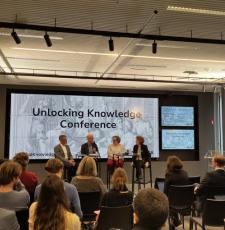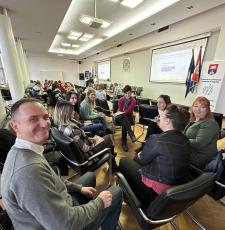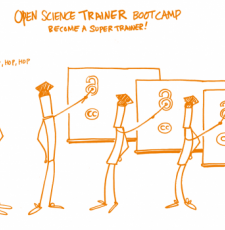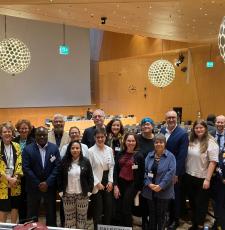
Teresa Hackett, EIFL Copyright and Libraries Programme Manager, reports on recent evidence highlighting the need for strong copyright exceptions for libraries to support the delivery of online content and services during the COVID-19 pandemic.
As the world moves from emergency mode to living with COVID, libraries are taking stock of the impact of the global pandemic on library services from a copyright and licensing perspective. Early results indicate that support for online education and access to knowledge fell short of what was needed during the pandemic.
How well did copyright laws serve libraries during COVID-19?
In February 2022, EIFL and IFLA (International Federation of Library Associations and Institutions) distributed an online survey to librarians seeking information on experiences relating to copyright and licensing of electronic resources during the pandemic.
114 responses were received from 29 countries across six continents, including 10 EIFL partner countries (Armenia, Botswana, Georgia, Kenya, Lesotho, Lithuania, Malawi, Maldives, Palestine, Zimbabwe). Overall, the responses revealed a deep, widespread frustration with legal, technical and pricing barriers that hampered, severely limited or prevented access to library materials during COVID lockdowns.
The vast majority of respondents (83%) reported first-hand experiences of copyright challenges during pandemic-related library closures. For example, 69% reported problems providing access to textbooks amid a surge in demand from students and a reluctance by many publishers to provide affordable, licensed access. Just over half (52%) reported difficulties supporting students and faculty who had returned to their home countries, due to differences in national copyright laws and licensing conditions that restricted access in other jurisdictions. And while temporary expanded access granted by publishers to certain electronic resources was a welcome gesture, it either didn’t last long enough or the usage conditions were too complicated to allow the content to be meaningfully integrated into teaching and research activities (48%).
"Most staff and students…assume everything is available as an e-book. They don’t understand these restrictions are not the libraries’ choice, but the publishers’. It’s difficult to respond to students who say ‘why can’t we access this?’ If it’s not available, my hands are tied."(UK)
Libraries supporting online teaching also faced tricky legal questions, for example, was playing music and films in an online setting allowed? Could lectures that contained copyrighted material be recorded and made available online? Did the fact of the global pandemic ease the rules? Librarians around the world did their best to obtain fast legal guidance, some made their own calculated risk assessment, while others tried to muddle through the gray zones and legal uncertainties.
The research report published by IFLA analyzing responses to the survey concludes that there is an urgent need to clarify the rights and protections afforded to libraries under copyright law in the online environment. In many countries, clarification means updating copyright exceptions for the digital environment so that libraries are better prepared to deal with future emergencies, including pandemics. While the issues highlighted by the pandemic were not new, COVID brought them to a head.
The benefits of ‘open’ in a pandemic
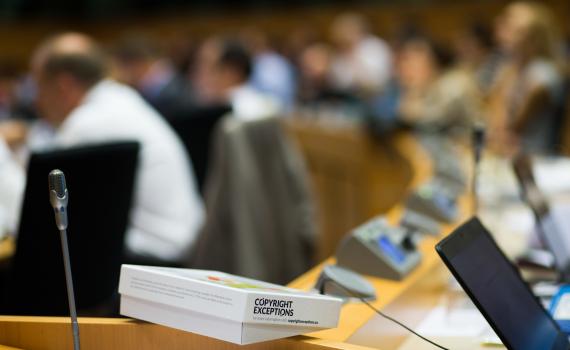 In May 2022, WIPO (the World Intellectual Property Organization) held an Information Session on the Impact of the COVID-19 Pandemic on the Copyright Ecosystem that included the work of libraries and archives, and the areas of education and research.
In May 2022, WIPO (the World Intellectual Property Organization) held an Information Session on the Impact of the COVID-19 Pandemic on the Copyright Ecosystem that included the work of libraries and archives, and the areas of education and research.
For the information session, EIFL submitted 11 examples of the impact of COVID on the work of libraries, highlighting experiences in Kenya, Malawi, South Africa, Uganda and Zimbabwe.
The examples show that in times of a global emergency, libraries and educators need clear rights backed by law. For example, a lecturer in South Africa was unable to get permission to upload sections of an e-book onto the institution’s password protected e-learning platform during lockdown (the physical book was stuck in the library), and some public librarians couldn’t get permission to hold online reading sessions on YouTube and other e-platforms during lockdowns.
In Kenya, some libraries that wanted to digitize information resources did not have funds to pay the required licence fees. In Zimbabwe, licence restrictions meant that some e-resources could only be viewed online, downloaded one page at a time, or could not be printed out. This created challenges for students in rural areas who did not have internet access and for those in towns challenged by power cuts.
To help alleviate these situations, librarians looked to use alternative materials. For example, librarians in Malawi ramped up efforts to identify, encourage and promote use of open access materials and open educational resources. In Uganda, librarians made full use of materials in the public domain or content available under an open licence, for example, the National Curriculum Development Centre produced home-schooling materials licensed for non-commercial uses, such as teaching.
The pandemic has highlighted the benefits of open access for education, science and society and the need for a copyright ecosystem that supports online education and research. As the above examples show, current copyright rules fell short of what was needed during the pandemic.
WIPO study on the impact of the COVID-19 pandemic - what about exceptions?
WIPO’s Information Session on the Impact of the COVID-19 Pandemic on the Copyright Ecosystem took place in Geneva in May 2022 during the 42nd session of the Standing Committee on Copyright and Related Rights (SCCR/42). The COVID information session aimed to explore the “impact of the pandemic on the cultural, creative and educational ecosystem, including copyright, related rights, and limitations and exceptions”.
A WIPO-commissioned study on the topic was presented at the information session, and a round table panel discussion featured experts from the different sectors.
A remarkable feature of the study was the lack of attention to the issue of limitations and exceptions (L&Es), for example, the word ‘exceptions’ appears just four times in the 67-page study. The omission is surprising for three reasons: L&Es were among the specific objectives set out for the information session, SCCR is WIPO’s specialist committee on copyright, and L&Es for libraries, archives and education are actively being discussed at SCCR.
The study seems reluctant to recognize L&Es. For example, one of the study’s conclusions appears to be a veiled reference to exceptions, although it’s meaning is not quite clear: “The COVID-19 pandemic raised the need for the provision of clarity to institutions and organizations regarding the copyright implications of moving towards a digital world…" At the same time, licensing is emphasized throughout the study. And another conclusion, that comes out in favour of licensing, seems to link online uses of material in education and research settings with piracy.
These problems with the study were highlighted at the information session by Communia and many NGOs who asked searching questions on the role of exceptions during the pandemic (positive and negative experiences), the challenges of outdated exceptions, and solutions that might be needed to overcome these challenges.
Of course, copyright issues inevitably cropped up during the panel discussion. For example, two of the three issues identified by the panelist from South Africa as challenges during the pandemic concerned copyright. These were the availability of material in home languages, and access to material behind paywalls (the third issue was broadband access). Watch EIFL’s question to the panelist.
The failure of the WIPO study to properly address the role of exceptions in education and research during the pandemic was a missed opportunity. Exceptions are an essential part of the copyright ecosystem, and they cannot simply be ignored and they will not simply go away.
See also commentary by IFLA on the WIPO study.
Further information
- WIPO Study The Impact of the COVID-19 Pandemic on Creative Industries, Cultural Institutions, Education and Research
- EIFL resource: COVID case studies
- EIFL resource: Copyright and emergencies: tips for librarians
- EIFL blog: COVID lessons - copyright and online learning
- EIFL blog: COVID and copyright: the right to research
SHARE / PRINT






